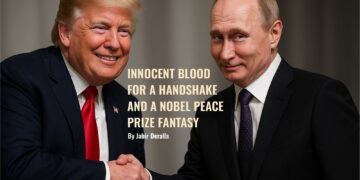By XHABIR DERALLA
Hidden nationalism is, in many ways, just as harmful and destructive as militant nationalism. Latent or hidden nationalism is relatively difficult to recognize and identify, and even more difficult, if not also impossible, to eradicate. I’m not talking here only about the attitudes “my best friend from the army was Albanian”, or “the Albanians are people too”, which even the little kids already know are nationalistic or can stem from nationalist narratives for which even the very bearers themselves are often not aware of.
Expensively paid – nationalist – media-NGO projects
Unskillfully hidden nationalism can also be found in various expensively paid media-NGO projects in which, under the very surface of messages on “respect for diversity”, obvious nationalistic views, prejudices and stereotypes are openly “laughing”.
Examples of, more or less, hidden nationalism can be found everywhere, in everyday life, in media information programs, in statements of experts and politicians.
One of the nationalistically motivated delusions is also the practice of daily, persistent insistence on percentages – by ethnic affiliation – in public opinion surveys. With a politically dosed use of statistics, not only is the reality in the country not presented, but it is also distorted and obscured, of course, in favor of the nationalistic and anti-Western propaganda.
Statistics through an ethnic prism
Statistics arefrequently presented through an ethnic prism. Hence, repeating the “great discoveries” that the views of the Macedonians and Albanians differ significantly on many issues, such as membership in NATO or the EU, is already notorious.
Among the Albanians, the percentage of support for the EU and NATO is higher, and lower among the Macedonians. These differences in the proportions are repeated and commented on endlessly. The fact that the majority of ethnic Macedonians also share the attitude of their fellow Albanians is relativized or kept silent.
The difference in the proportions, that is, percentages of support, by ethnic affiliation, serves to create nationalistic narratives. Those narratives are hidden behind “expertise, objectivity and statistics”. So, intentionally or unintentionally (usually intentionally), disqualification of the Albanians as citizens of this country occurs.
Outvoted in “their own country”
Accordingly, the “scientific and legal” interpretation that the Macedonians are outvoted in the parliament of “their own country/state” is not surprising, and not to mention the strong nationalistic position that an Albanian cannot be a Minster of Foreign Affairs.
No need for additional explanation
In this way, we come to the widespread view that the Albanians shouldn’t even take part in the decision-making of key processes in the country. It doesn’t matter what the Albanians think. They have no right to decide!
Why? Simple, because they are not ethnic Macedonians! Is there a need for additional explanation!?
Nationalism is settling in society, unskillfully and insufficiently well hidden, supported by the “scientific weight” of statistics and the expert opinion of hard-line nationalists among experts, NGOs and media and –and serves as a weapon against the Euro-Atlantic integration and against the multicultural character of the country.
The many years of repeating the ethnic proportions in order to support these processes, has prepared the ground for ultra-nationalist statements by university professors and human rights experts, NGO leaders (enriched by EU funds) and “moderate” politicians. Their statements, following the many years of “processing” the public opinion, even sound “soft” and surely “very realistic” too.
Translation: N. Cvetkovska
















